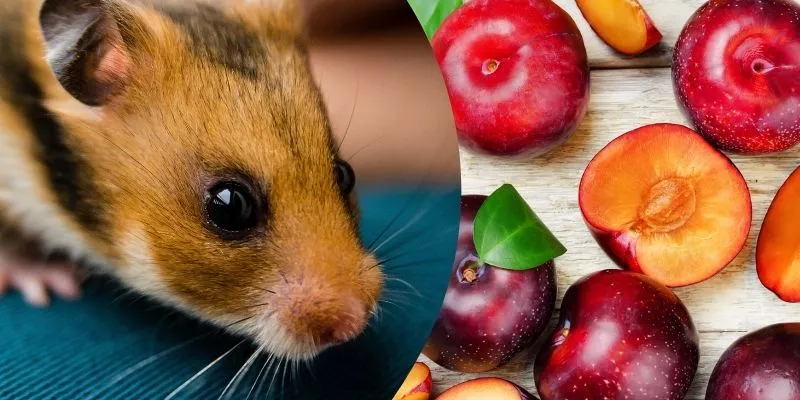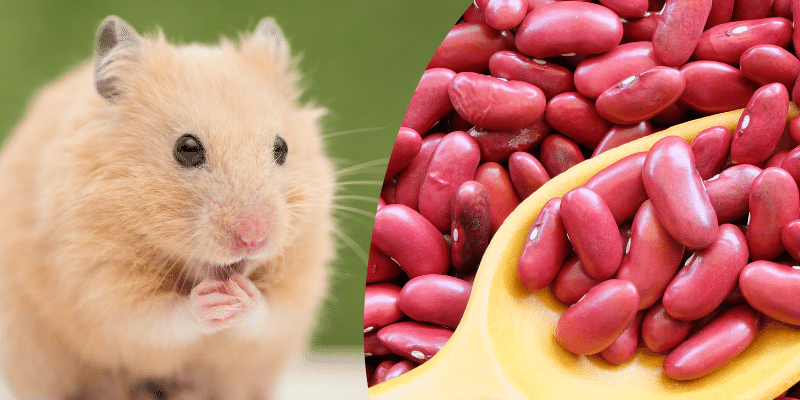We all know that our furry friends, Hamsters, love to nibble on things, so we are often worried about what they can and cannot have as food. So before you share plum with your hamster, a question may pop up in your mind, Can Hamsters Eat Plums? Is it safe for them?
To answer this question, I did a quick research on the topic, and here’s what I know:
Can Hamsters Eat Plums? Hamsters can eat plums as long as the plums are cooked soft enough for their teeth. Syrian and Robo can eat raw plums in very small amounts, while Dwarf hamster’s digestive system cannot process plums because of the high level of sugar in it.
How to Prepare Plums for Hamsters?
To prepare plums for hamsters, you need to wash the plum then cut it in half to remove the pits. Next, you need to boil or steam the plum (until softened) for about 30 minutes; – let cool a little before feeding your pet with it.
Boiling of the plum is necessary to reduce the high level of sugar in plums.
Dwarf hamsters cannot digest sugary fruits well, so make sure you do not overfeed them.
Instead of plums, you can give your hamster nuts, seeds, eggs, or cheese, which is completely safe for them. However, they should not be fed high-fat or salty foods (like bacon) because it might cause them to have a heart attack; – which is very dangerous for their health.
How Many Plums Can A Haster eat?
Syrian and Roborovski hamsters can eat about three medium-sized plums, while Dwarf hamsters cannot eat plums because of the high sugar level in plums.
Hamsters are not as picky as cats or dogs when it comes to food. Hamsters can eat just about anything, but you should make sure that they do not overeat anything because it may be harmful to them. They should have an assortment of carrots, sweet potatoes, cooked pasta, oats, dried cornmeal, grains, squash, canned pumpkin with some frozen veggies on the side. You should never feed your pet any form of meat because it could lead to illness or death.
What Can Cause Plum Poisoning In Hamsters?
Before you give your hamster’s plums, you need to know certain things that can cause plum poisoning in hamsters. Fortunately, there are only a few conditions that could be responsible for the poisoning, and they are listed below:
- The hamster ate too many uncooked plums.
- Hamster ate the plums pits, leaves, or stem
- Hamster ate processed plums that have flavour.
Plum leaves, seed and stem contain cyanide, which is dangerous for hamsters. If your hamsters mistakenly eat any of these, immediately take your hamster to the nearby veterinary clinic.
Symptoms of Plum Poisoning In Hamsters?
If your hamster eats plum leaves, stems, or pits, there is a possibility that your hamster will suffer from plum poisoning. Below are symptoms of plum poisoning in hamsters:
- Vomiting Panting
- Less movement
- Dilated pupils
If your hamster shows these symptoms, immediately take your hamster to the nearby veterinary clinic for immediate medical attention.
What Are The Health Benefits Of Your Hamsters Eating Plums?
As we explore this question, it’s important to remember one basic fact about hamsters: they’re not really picky eaters! Hamsters will happily chow down on anything from bananas and apples to peanuts and pears, but this doesn’t mean you should give them all types of fruits.
Plums are juicy, purple, red-coloured fruit available seasonally. They have citrus and sweet taste to them but also offer many benefits for your hamster’s health that you might not know about! Plums contain dietary fibres that aid in digestion and Vitamin C, carbohydrates, potassium, and vitamin K – all of this help promote healthy fur on the body of your hamster while promoting eye health thanks to Vitamins A & C present in plums.
Can My Hamsters Eat Dried Plums?
One of the major benefits of feeding your hamsters dried plums is that it can give them a boost of energy when they’re feeling tired or listless because it contains sugar. However, you should only give your hamster dried plums only once a week (avoid feeding dried plums to dwarf hamsters, as dried plum is more sugary).
Dwarf hamster’s digestive system cannot process sugary fruits, so feeding them sugary fruits will cause more harm than good.
Increased intake of sugar is associated with an increased risk of diabetes and heart disease. So it is something to be aware of if you feed your hamsters dried plums because they are high in sugar.
Fruits Harmful for Hamsters
Hamsters are the cutest animals in existence and it’s hard not to want one as a pet. Before you buy a hamster, you should know about fruits that are harmful to hamsters. Here is the list of 13 foods that are dangerous for our little friends:
- Lemon
- Pineapple
- raisins
- apple seed
- grapes
- pears
- Onion
- Orange
- Raw beans
Did I Answer Everything You Wanted To Know About Can Hamsters Eat Plums?
If you’re considering feeding your hamsters plums, it’s important to know the health benefits and risks. Dried plums are high in vitamin C and fibre, which will keep hamsters healthy. However, the pits, leaves, and stems of plums are not good for hamsters, and remember not to give your hamster plums more than once per week. You should also avoid giving them more than 2-3 pieces at once
However, never feed your pet anything without first checking with your vet! It doesn’t matter how tasty something is. If your hamsters eat any poisonous fruits, first note down the symptoms and immediately seek medical advice.


